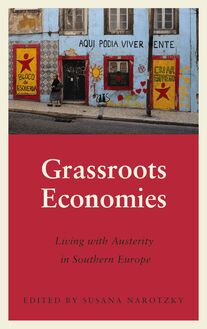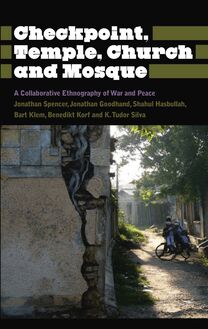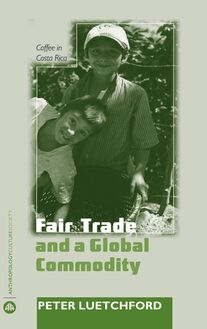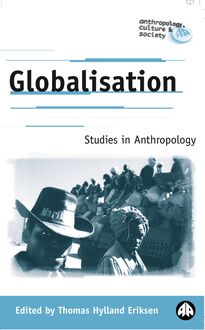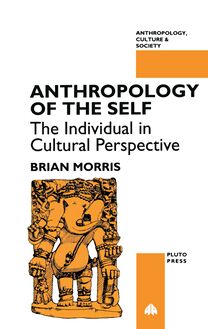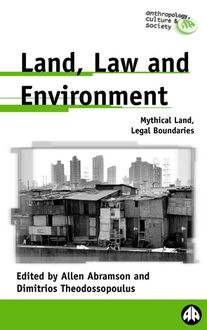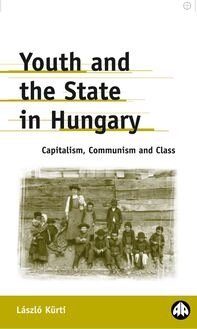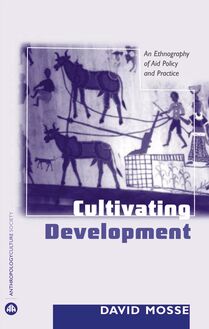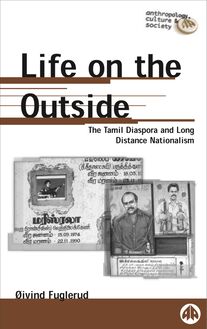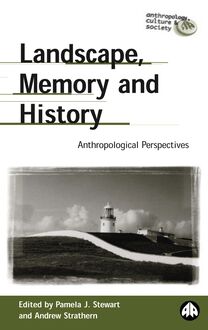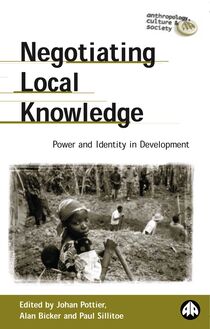Cultures of Fear , livre ebook
244
pages
English
Ebooks
2009
Vous pourrez modifier la taille du texte de cet ouvrage
Obtenez un accès à la bibliothèque pour le consulter en ligne En savoir plus
Découvre YouScribe et accède à tout notre catalogue !
Découvre YouScribe et accède à tout notre catalogue !
244
pages
English
Ebooks
2009
Vous pourrez modifier la taille du texte de cet ouvrage
Obtenez un accès à la bibliothèque pour le consulter en ligne En savoir plus
Publié par
Date de parution
09 octobre 2009
Nombre de lectures
1
EAN13
9781783713707
Langue
English
Freedom from fear is a universal right and fundamental for human well-being. People often look to governments, humanitarian agencies, and other institutions to further this aim. However, this book shows that these organisations often use the same logic of fear to monitor, control, and contain human beings in zones of violence.
This is an excellent interdisciplinary reader for students of anthropology, sociology and politics. Contributors include Noam Chomsky, Slavoj Zizek, Jean Baudrillard, Catharine MacKinnon, Neil Smith, Cynthia Enloe, David L. Altheide, Cynthia Cockburn and Carolyn Nordstrum.
Acknowledgments
1. Fear: a conceptual framework by Uli Linke and Danielle Taana Smith
Part One: Cultures of Fear
2. The New War against Terror by Noam Chomsky
3. Engineering Ruins and Affect by Joseph Masco
4. Terrorism and the Politics of Fear by David L.
5. Welcome to the Desert of the Real by Slavoj Žižek
Part Two: States of Terror
6. Human Rights and Complex Emergencies by Lucia Ann McSpadden and John R. MacArthur
7. Speechless Emissaries by Liisa H. Malkki
8. Trauma and Vulnerability During War by Doug Henry
9. The Violence of Humanitarianism by Miriam Ticktin
Part Three: Zones of Violence
10. Gender, Terrorism, and War by Susan J. Brison
11. The Continuum of Violence by Cynthia Cockburn
12. Child Soldiers by Julia Dickson-Gómez
13. Girls Behind the (Front) Lines by Carolyn Nordstrom
14. On the Run by Solrun Williksen
Part Four: Intimacies of Suffering
15. War and Sexual Violence by Elisabeth Jean Wood
16. Militarizing Women's Lives by Cynthia Enloe
17. The Political Economy of Rape by Meredeth Turshen
18. On the Torture of Others by Susan Sontag
Part Five: Normalizing Terror
19. Cultural Appropriations of Suffering by Arthur Kleinman and Joan Kleinman
20. The Biopolitics of Disposability by Henry A. Giroux
21. Empire of Camps by Nicholas Mirzoeff
Index
Cultures of Fear
Anthropology, Culture and Society
Series Editors: Professor Vered Amit, Concordia University and Dr Jon P. Mitchell, University of Sussex
Published titles include:
Home Spaces, Street Styles: Contesting Power and Identity in a South African City L ESLIE J. B ANK
On the Game: Women and Sex Work S OPHIE D AY
Slave of Allah: Zacarias Moussaoui vs the USA K ATHERINE C. D ONAHUE
A History of Anthropology T HOMAS H YLLAND E RIKSEN AND F INN S IVERT N IELSEN
Ethnicity and Nationalism: Anthropological Perspectives Second Edition T HOMAS H YLLAND E RIKSEN
Globalisation: Studies in Anthropology Edited by T HOMAS H YLLAND E RIKSEN
Small Places, Large Issues: An Introduction to Social and Cultural Anthropology Second Edition T HOMAS H YLLAND E RIKSEN
What is Anthropology? T HOMAS H YLLAND E RIKSEN
Anthropology, Development and the Post-Modern Challenge K ATY G ARDNER AND D AVID L EWIS
Corruption: Anthropological Perspectives Edited by D IETER H ALLER AND C RIS S HORE
Culture and Well-Being: Anthropological Approaches to Freedom and Political Ethics Edited by A LBERTO C ORSIN J IMENEZ
Fair Trade and a Global Commodity: Coffee in Costa Rica P ETER L UETCHFORD
The Will of the Many: How the Alterglobalisation Movement is Changing the Face of Democracy M ARIANNE M AECKELBERGH
The Aid Effect: Giving and Governing in International Development Edited by D AVID M OSSE AND D AVID L EWIS
Cultivating Development: An Ethnography of Aid Policy and Practice D AVID M OSSE
Anthropology, Art and Cultural Production M ARUŠKA S VAŠEK
Race and Sex in Latin America P ETER W ADE
Anthropology at the Dawn of the Cold War: The Influence of Foundations, McCarthyism and the CIA Edited by D USTIN M. W AX
Learning Politics from Sivaram: The Life and Death of a Revolutionary Tamil Journalist in Sri Lanka M ARK P. W HITAKER
CULTURES OF FEAR
A Critical Reader
Edited by Uli Linke and Danielle Taana Smith
First published 2009 by Pluto Press 345 Archway Road, London N6 5AA and 175 Fifth Avenue, New York, NY 10010
www.plutobooks.com
Distributed in the United States of America exclusively by Palgrave Macmillan, a division of St. Martin’s Press LLC, 175 Fifth Avenue, New York, NY 10010
Copyright © Uli Linke and Danielle Taana Smith 2009
The right of the individual contributors to be identified as the authors of this work has been asserted by them in accordance with the Copyright, Designs and Patents Act 1988.
British Library Cataloguing in Publication Data
A catalogue record for this book is available from the British Library
ISBN 978 0 7453 2966 6 Hardback
ISBN 978 0 7453 2965 9 Paperback
ISBN 978 1 8496 4432 7 PDF eBook
ISBN 978 1 7837 1371 4 Kindle eBook
ISBN 978 1 7837 1370 7 EPUB eBook
Library of Congress Cataloging in Publication Data applied for
This book is printed on paper suitable for recycling and made from fully managed and sustained forest sources. Logging, pulping and manufacturing processes are expected to conform to the environmental standards of the country of origin. The paper may contain up to 70 percent post-consumer waste.
10 9 8 7 6 5 4 3 2 1
Designed and produced for Pluto Press by Chase Publishing Services Ltd, 33 Livonia Road, Sidmouth, EX10 9JB, England Typeset from disk by Stanford DTP Services, Northampton, England Printed and bound in the European Union by CPI Antony Rowe, Chippenham and Eastbourne
Contents
Acknowledgments
Series Preface
1 .
Fear: A Conceptual Framework Uli Linke and Danielle Taana Smith
PART I CULTURES OF FEAR
2 .
The New War Against Terror Noam Chomsky
3 .
Engineering Ruins and Affect Joseph Masco
4 .
Terrorism and the Politics of Fear David L. Altheide
5 .
Welcome to the Desert of the Real! Slavoj Žižek
PART II STATES OF TERROR
6 .
Human Rights and Complex Emergencies Lucia Ann McSpadden and John R. MacArthur
7 .
Speechless Emissaries Liisa H. Malkki
8 .
Trauma and Vulnerability during War Doug Henry
9 .
The Violence of Humanitarianism Miriam Ticktin
PART III ZONES OF VIOLENCE
10 .
Gender, Terrorism, and War Susan J. Brison
11 .
The Continuum of Violence Cynthia Cockburn
12 .
Child Soldiers: Growing Up in a Guerilla Camp Julia Dickson-Gómez
13 .
Girls Behind the (Front) Lines Carolyn Nordstrom
14 .
On the Run: Narrative of an Asylum Seeker Solrun Williksen
PART IV INTIMACIES OF SUFFERING
15 .
War and Sexual Violence Elisabeth Jean Wood
16 .
Militarizing Women’s Lives: When Soldiers Rape Cynthia Enloe
17 .
The Political Economy of Violence: Women during Armed Conflict in Uganda Meredeth Turshen
18 .
On the Torture of Others Susan Sontag
PART V NORMALIZING TERROR
19 .
Cultural Appropriations of Suffering Arthur Kleinman and Joan Kleinman
20 .
The Biopolitics of Disposability Henry A. Giroux
21 .
Empire of Camps Nicholas Mirzoeff
Notes on Contributors
Index
Acknowledgments
Uli Linke, and Danielle Taana Smith, “Fear: a Conceptual Framework.” Copyright © Pluto Press, 2009.
Noam Chomsky’s “The New War against Terror” is an abridged version of the transcript of a lecture given at the Massachusetts Institute of Technology (MIT) Technology and Culture forum, October 18, 2001. It is available online at: < http://www.chomsky.info/talks/20011018.htm .> Reproduced by permission of the author. Copyright © 2001 and 2009 by Noam Chomsky.
Joseph Masco’s “Engineering Ruins and Affect” is an excerpted version of “‘Survival is Your Business’: Engineering Ruins and Affect in Nuclear America,” Cultural Anthropology , 23(2), 2008: 361–398. Reproduced by permission of the American Anthropological Association. DOI: 10.1111/j.1548-1360.2008.00012.x. Not for sale or further reproduction.
David L. Altheide’s chapter is an abridged version of “Terrorism and the Politics of Fear,” Cultural Studies–Critical Methodologies , 6(4): 415–439. Copyright © 2006 by SAGE Publications. Reprinted by permission of SAGE Publications.
Slavoj Žižek’s “Welcome to the Desert of the Real!” is taken from an essay posted on The Global Site (University of Sussex), September 15, 2001. Copyright © 2001 and 2009 by Slavoj Žižek. Reproduced by permission of the author.
Lucia Ann McSpadden and John R. MacArthur’s “Human Rights and Complex Emergencies” is excerpted from the Bulletin of the National Association for the Practice of Anthropology , 21: 36–55. DOI:10.1525/napa.2001.21.1.36. Reproduced by permission of the American Anthropological Association. Not for sale or further reproduction.
Liisa H. Malkki’s “Speechless Emissaries: Refugees, Humanitarianism, and Dehistoricization” is an excerpted version of her article in Cultural Anthropology 11(3), 1996: 377–404. Reproduced by permission of the American Anthropological Association. Not for sale or further reproduction.
Doug Henry’s “Trauma and Vulnerability During War” is excerpted from “Violence and the Body: Somatic Expressions of Trauma and Vulnerability During War,” Medical Anthropology Quarterly 20(3), 2006: 379–398. Reproduced by permission of the American Anthropological Association. Not for sale or further reproduction.
Miriam Ticktin’s “The Violence of Humanitarianism” is excerpted from “Where Ethics and Politics Meet: The Violence of Humanitarianism in France,” from American Ethnologist , Volume 33(1), 2006: 33–49. Reproduced by permission of the American Anthropological Association. Not for sale or further reproduction.
Susan J. Brison’s “Gender, Terrorism, and War” is an excerpt from “Gender and September 11: A Roundtable: Gender, Terrorism, and War,” Signs 28(1) (Autumn), 2002: 435–437. Copyright © 2002, The University of Chicago Press. Reproduced with permission of The University of Chicago Press.
Cynthia Cockburn’s “The Continuum of Violence: A Gender Perspective on War and Peace” is an excerpt from her chapter in Wenona Giles and Jennifer Hyndman (eds.), Sites of Violence: Gender and Conflict Zones , 2004: 30–36, 39–44. Berkeley: The University of California Press. Copyright © 2004 The Regents of the University of California. Reproduced by permission of The University of California Press.
Julia Dickson-Gómez’s “Child Soldiers” is an excerpt from “Growing Up in Guerrilla Camps: The Long-Term Impact of Being a Child Soldier in El Salvador’s Civil War,” Ethos , 30(4), 2003: 327–356. Reproduced by permission of the American Anthropological Association. Not for sale or further reproduction.
Carolyn Nordstrom’s “Girls Behind the (Front) Lines” was published in Peace Review: A Journal of Social Justice , 8(3) (September), 1996: 403–409. Published by Taylor & Francis. Copyright © 1996 Routledge. Reprinted by permission of the publisher (Taylor & Francis Group, < http://www.informaworld.com >).
Solrun Williksen’s “On the Run: The Narrative of an Asylum Seeker” is an abridgement of an article in Anthropology and Humanism , Volume 29(2), 2004: 117–132. DOI: 10.1525/ahu.2004.29.2.117.15. Reproduced by permission of the American Anthropological Association. Not for sale or further reproduction.
Elisabeth Jean Wood’s “War and Sexual Violence” is an edited excerpt from “Sexual Violence During War: Toward an Understanding of Variation,” in Stathis N. Kalyvas, Ian Shapiro, and Tarek Masoud (eds.), Order, Conflict, and Violence , Cambridge University Press 2008: 321–351. Copyright © Cambridge University Press, reproduced with permission. The author thanks Regina Muehlhaeuser for her skillful abridgement.
Cynthia Enloe’s “Militarizing Women’s Lives” is an excerpt from “When Soldiers Rape,” in Maneuvers: The International Politics of Militarizing Women’s Lives , Berkeley: The University of California Press, 2000: 108–152. Copyright © 2000 The Regents of the University of California. Reproduced by permission of the University of California Press.
Meredeth Turshen’s chapter is based on “The Political Economy of Violence against Women during Armed Conflict
